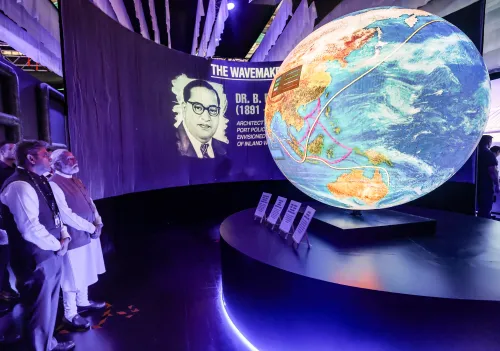Is India Leading the World in Generative AI Adoption with 92% Workforce Engagement?

Synopsis
Key Takeaways
- India leads global generative AI adoption with 92% usage.
- Concerns about job security affect 48% of employees.
- Only 36% of employees feel adequately trained for AI.
- Companies achieving productivity gains redesign workflows.
- AI agents are crucial for efficient task execution.
New Delhi, June 26 (NationPress) India is at the forefront of global generative AI adoption in the workplace, boasting an impressive 92% of its workforce utilizing such technologies regularly. This figure significantly surpasses the worldwide average of 72%, according to a recent report released on Thursday. The research conducted by the Boston Consulting Group (BCG) emphasizes that while AI has become widely accepted globally, tangible business benefits are predominantly observed in organizations that are revamping their workflows and committing resources towards employee training and leadership development.
Despite the extensive adoption, there is a rising concern among Indian workers regarding their job security. Almost half (48%) of the workforce expresses fears that their positions may be at risk over the next decade due to advancements in AI and automation technologies.
Nipun Kalra, Managing Director & Senior Partner at BCG India, remarked that while Indian employees are some of the most eager adopters of AI, they also harbor significant apprehensions. "India is ranked among the top three countries worldwide in terms of incorporating AI agents into workflows, with 17% of the workforce reporting their use. However, only about one-third feel sufficiently trained to leverage AI's full potential," Kalra stated.
Vinciane Beauchene, BCG’s Global Lead on Human x AI and co-author of the report, emphasized that "companies that evolve their workflows and invest in their people are experiencing greater success."
She added that "successful integration hinges on a well-defined strategy to address how AI affects work dynamics, the individual worker, and the overall workforce."
The findings highlight the necessity for comprehensive training to unlock the real potential of AI. Currently, only 36% of employees worldwide feel adequately equipped for AI utilization.
Those who undergo five or more hours of practical training, particularly through in-person sessions with expert guidance, are significantly more inclined to become regular users of AI technologies.
The report indicates that businesses achieving substantial productivity improvements from AI are those that undertake a complete redesign of their workflows, rather than just rolling out new tools.
These organizations invest in employee training, monitor outcomes, enhance decision-making processes, and inspire their teams to focus on strategic, high-value tasks.
Moreover, the report underscores the increasing relevance of AI agents, which are digital assistants capable of executing tasks autonomously.










